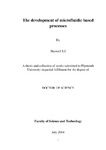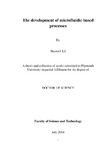The development of microfluidic based processes
| dc.contributor.author | Haswell, Stephen John | |
| dc.contributor.other | Faculty of Science and Engineering | en_US |
| dc.date.accessioned | 2016-01-08T14:15:11Z | |
| dc.date.available | 2016-01-08T14:15:11Z | |
| dc.date.issued | 29/09/2015 | |
| dc.date.issued | 2015 | |
| dc.identifier | 301281491 | en_US |
| dc.identifier.uri | http://hdl.handle.net/10026.1/4189 | |
| dc.description | Full version unavailable due to 3rd party copyright restrictions. | |
| dc.description.abstract |
The work submitted for consideration of the award of a DSc represents a large sub section (102 of 210 published papers) of the candidates (Haswell) sustained research over a period of 20 years in the field of micro fluidic based processes. The candidate became aware of the potential of the field of research in 1986, when developing gas sensors, through the paper by Terry et al. published in IEEE Trans. Electron. Devices in 1979, in which the authors described a fully operational gas chromatography instrument produced on a silicon wafer using photolithographic and wet etching methodology. In the late 1980’s the candidate adapted the work of Terry to produce etched patterned glass substrates which were used to develop a microfluidic flow injection device for determining orthophosphate based on electroosmotic pumping. This work represented one of the first analytical devices of its type to be reported in the literature (paper 1). Internationally, work in the field had been developing since the 1989 Transducers Conference where the term micro Total Analytical System was first used and by 1995 was concentrated in five centres based in Europe (Basil Switzerland, Twente The Netherlands) and North America (Berkeley California, Oak Ridge Tennessee, Alberta). In addition to analytical methodology, groups in Europe (Mainz Germany) and North America (MIT USA) were also exploring the generation of metal based micro reactor systems. The candidate attended and presented work at both the first micro total analytical systems conference in 1994 held in The Netherlands and the first International Conference on Microreaction Technology (IMRET) held in Frankfurt Germany in 1997. It is from this base the candidate established over a period of two decades an internationally recognized research activity in the field of microfluidics and lab on a chip technology. | |
| dc.language.iso | en | en_US |
| dc.publisher | Plymouth University | en_US |
| dc.subject | Doctor of Science | |
| dc.subject | Microfluidics | |
| dc.subject | Micro reactors | |
| dc.subject | Lab on a chip | |
| dc.title | The development of microfluidic based processes | en_US |
| dc.type | Thesis | |
| plymouth.version | Edited version | en_US |
| dc.identifier.doi | http://dx.doi.org/10.24382/3324 |
Files in this item
This item appears in the following Collection(s)
-
01 Research Theses Main Collection
Research Theses Main



